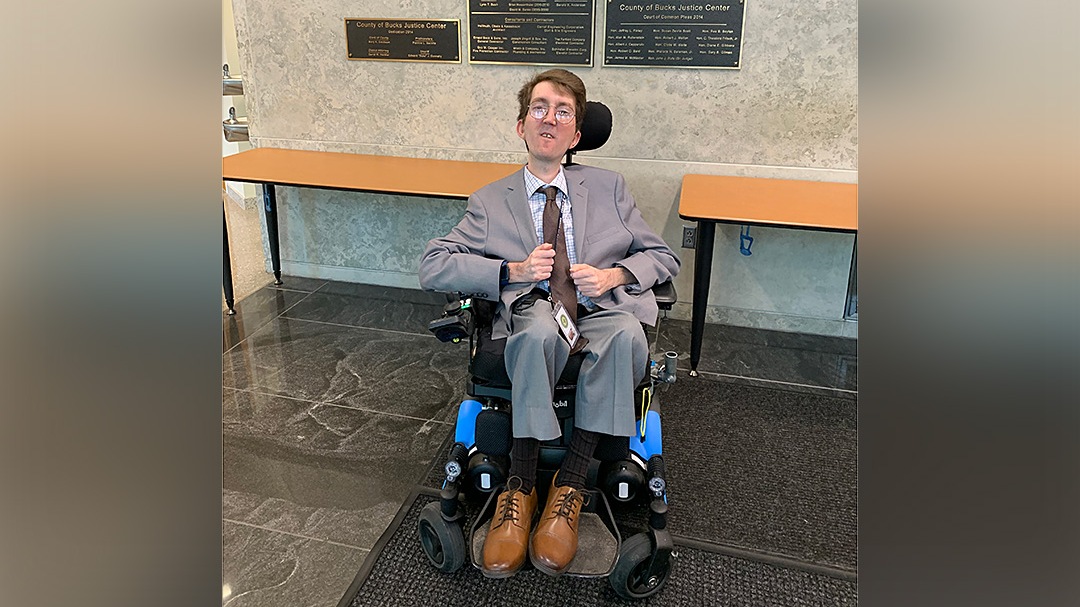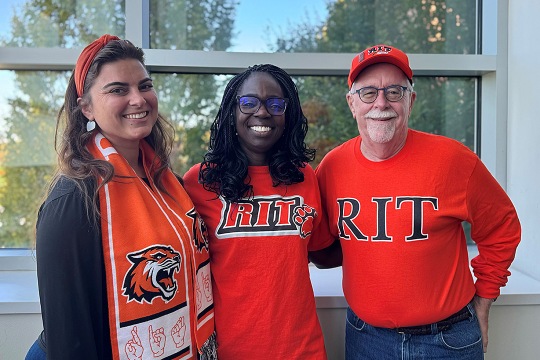Alexander Van Hook, a 2016 political science graduate, has set himself on the career path to success in the legal field. An individual with cross-disabilities, Van Hook is a future attorney and disability rights advocate working to bring awareness of fundamental legal rights of persons with disabilities, accessibility, and inclusion.
Van Hook discovered his passion for legal work and disability rights advocacy through his first internship within the American Association of People with Disabilities (AAPD) Summer Internship Program on Capitol Hill in Washington D.C., where he was responsible for conducting a project related to accessibility issues and disability rights. He eventually gained key legal work experience through internships, externships, and volunteering with legal organizations that provided legal assistance and advocacy services for clients.
After graduating from RIT, Van Hook continued his education at American University, where he earned a master’s degree in public administration in 2018 and Juris Doctor in 2021. He now is a full-time law clerk for a judge at the Court of Common Pleas of Bucks County.
In a Q&A interview with Alumni News, Van Hook shares how his education, experience, and journey helped him prepare for a success in the legal profession.
What made you interested in pursuing a career in law?
My interest in a legal career has been in the making for many years. It started growing at some point during my childhood. I wanted to be a leader, and I think that I was inspired by President Lincoln because he was a lawyer, too. My interest also stemmed from my passion in using my identity and lived experience as a person with cross-disabilities to lead changes toward a more accessible and inclusive society for all. This passion was ignited by my first internship with the American Association of People with Disabilities (“AAPD”) Summer Internship Program in 2013, where I met other interns with disabilities and learned about tools to advocate for accessibility and inclusion.
How did your education and experience at RIT/NTID help you prepare you for a legal career?
My education and experience at RIT/NTID helped me prepare for a legal career through the political science program in RIT’s College of Liberal Arts, through my leadership experience in student organizations such as RIT Student Government and NTID Student Congress, and my volunteer involvement with Helping Educate to Advance the Rights of the Deaf ("HEARD"). It was RIT where I learned the important basics and theories of the political system in the US that are essential to the legal field as laws are developed through the political system. My leadership experience helped because, in the legal field, you need to know how to organize and work with people to advocate for change. HEARD also was important to me because it was a chance to work with people on a grassroots level. Overall, my years at RIT/NTID served as a pivotal foundation for my future career, and I will forever hold RIT/NTID in a special place in my heart.
You have worked as a volunteer, policy and legal intern, and student attorney for several organizations. Please share your experience—what was it like working at law firms?
My experience working at both the National Association of the Deaf’s Law and Advocacy team and at the Disability Rights Law Clinic (DRLC) at American University was invaluable.
At NAD, I was a legal extern during summer 2020. I assisted their legal team with intakes, which is where deaf and hard-of-hearing people would contact NAD about legal issues and we would interview them and determine how we could assist them or whether we should provide resources for self-advocacy. My responsibilities involved intake interviews, issue analysis, occasionally working with outside counsel, and other legal tasks. We only focus on discrimination issues, not general legal issues. This was a great experience because I was able to work with attorneys and clients who know ASL. I was exposed to important legal issues facing deaf and hard-of-hearing people in everyday life. I truly enjoyed my time with the NAD.
At DRLC, I served as a student attorney during my third (final) year of law school. A student attorney in law clinics is not a licensed attorney but is a law student who has special permission to work with clients on legal issues under faculty supervision. The DRLC serves clients and families with disabilities on disability rights issues. This experience was different from NAD because I was the only Deaf person in the clinic. It was a useful experience because I got to learn how to work with hearing people on legal issues. I worked with another student attorney as a team, and we worked together well. In fact, I helped her practice ASL. I also appreciated the fact that my law school provided ASL interpreters for the clinical experience. Clinical education is one of the most important things a law student should do during law school as it is the practical application of what we have been learning.
You graduated with degrees from RIT and American University with a goal of helping build a more accessible and inclusive world. What drives your passion for promoting accessibility and inclusivity and advocating for disability rights?
My identity and lived experience as a person with cross-disabilities is the main driver for my passion for promoting accessibility and inclusivity and advocating for disability rights. My 2013 internship through the AAPD Summer Internship Program really ignited that passion and helped in setting my path toward a career in disability rights advocacy. While disability rights laws have been in place for several years in the U.S., there is still so much improvement needed for accessibility and inclusion, such as wheelchair-accessible air transportation and better expectations by society toward people with disabilities.
What accomplishment are you most proud of?
At this point, I am most proud of my law school graduation. I worked more than a decade toward this goal, and it means a lot that I am able to add to a growing group of law graduates with disabilities. I am excited for what is to come next.
What advice do you have for RIT/NTID students who may be interested in becoming a disability rights advocate or pursuing a career that focuses on disability rights?
My advice would be to take your time. Everyone has their own pace. There always will be rejections and setbacks on the way, but there also will be accomplishments to celebrate. Keep learning about what interests you, never give up, and keep an open mind. Be sure to build your network. You will get there eventually as long as you keep your eyes on your goal.









